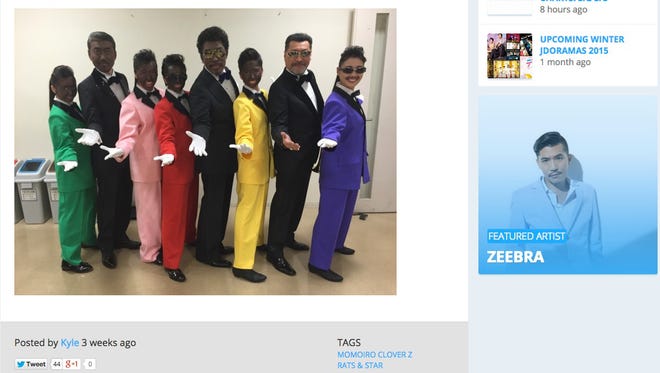Japan TV removes 'blackface' segment on popular music show

Corrections & clarifications: A previous version of this article misstated the views of Jeff Kingston, director of Asian Studies at Temple University's Tokyo campus.
TOKYO — Two Japanese music groups have learned the hard way that performing in "blackface" is no laughing matter. And with Tokyo preparing to host the Olympics Games and a horde of foreign visitors, it may not have come a moment too soon.
A major television network removed a segment from a popular music show last week after a photo of the pop group Momoiro Clover Z and doo-wop group Rats & Star in blackface makeup and minstrel-style costumes went viral on social media. The photo was initially posted on Twitter by Rats & Star.
The photo provoked a backlash that included a petition with more than 4,500 supporters at Change.org asking Fuji TV to pull the segment. The hashtag #StopBlackfaceJapan was heavily tweeted.
While not directly addressing the controversy, Fuji TV issued a statement this week saying it canceled the segment "after considering the overall circumstances."
The all-female Momoiro Clover Z is one of Japan's top pop acts and had been scheduled to appear on the program Music Fair with members of Rats & Star. That group, which peaked in popularity in the 1980s, has performed previously in blackface, without controversy. The show aired Saturday with a note that it had been edited.
Baye McNeil, an African-American author and columnist based in Yokohama, Japan, who spearheaded the campaign, said he was gratified by Fuji's reaction.
McNeil said he believed the groups intended to simply honor black music, but agreed that putting on blackface is "horribly inappropriate."
"Our motivation was to spare Japan the criticism and ridicule that surely would have come if that segment were aired," he added.
This is not the first time Japanese television has dealt with charges of racial stereotyping or insensitivity.
All Nippon Airways was forced to pull an ad last year that featured two Japanese actors in pilots uniforms — one wearing a cartoonish blond wig and exaggerated prosthetic nose — discussing the need to be more attuned to foreign passengers.
Japan is one of the world's most ethnically homogenous, if not culturally isolated, societies. Less than 2% of the population is foreign-born and immigration is largely non-existent.
English classes are compulsory beginning in grade school, but relatively few speak the language well. Enrollment at overseas universities, particularly in the United States, has dropped markedly in recent years.
A columnist at the right-leaning Sankei newspaper provoked outrage last month by suggesting immigrants to Japan should be required to live in segregated neighborhoods.
Tokyo is expecting to host some 20 million visitors a year by the time of the 2020 Tokyo Olympics. That's up from 13.4 million visitors in 2014.
Jeff Kingston, director of Asian Studies at Temple University's Tokyo campus, said of the TV segment, "Sadly, I imagine they thought it was harmless fun even if this is not the first time for such controversy and negative reactions."
"There will always be 'lost in translation' moments, but that's part of the allure of foreign travel. What people encounter here is mostly incredible hospitality, outstanding food and beautiful scenery," he said.
Phil Brasor, a Tokyo writer and music critic for The Japan Times, said social media was responsible for cancellation of last week's performance.
"Japanese show business is famously insular and doesn't really believe anyone except Japanese people care about what they do," he said.
"Social media allowed more people to discuss the situation openly both inside and outside Japan, and eventually that discussion made it back to Fuji TV. That would have never happened in the '80s."